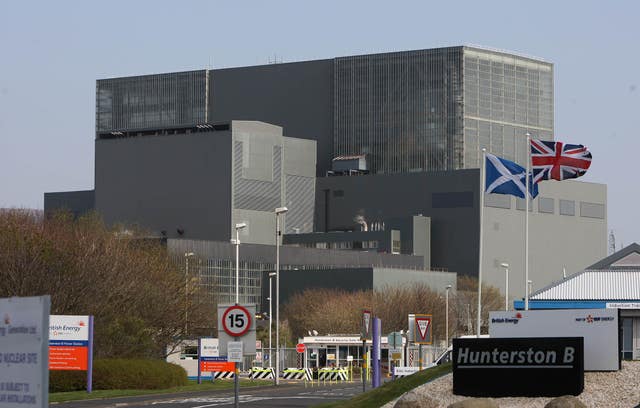A nuclear power station which had been forced to reduce output in the last few years because of cracks in its core will begin the decommissioning process by 2022.
Hunterston B power station in North Ayrshire previously had an estimated decommissioning date of 2023, with “a plus/minus two years proviso”.
On Thursday, operator EDF Energy announced the plant would move into the defuelling phase no later than January 7, 2022 – subject to an inspection next spring and regulatory approval for the final six months.
Construction work started on the site in 1968 before it opened and began generating energy in 1976.
“It has far exceeded its original remit and, over its lifetime, gone on to safely produce enough low carbon energy to power the whole of Scotland for eight years.
“We didn’t know back in the 1960s, when these plants were designed, just how important low carbon energy would become.
“We owe all those that designed, built, commissioned and still operate the station a huge debt of gratitude.
“Our focus is on continuing to safely deliver the last period of power generation and then transition the station into decommissioning.”
We’re pleased to be bringing one of #Hunterston B’s reactors back online in the coming days to generate #lowcarbon electricity. We’ve also confirmed we will start defuelling the #nuclear power station no later than 7 January 2022. Read more: https://t.co/JieFpNgh7E pic.twitter.com/Uxqdzns2fb
— EDF (@edfenergy) August 27, 2020
A spokeswoman told the PA news agency the move would give staff clarity and added there would be no immediate job losses because of the phase to defuelling.
There are approximately 520 full time EDF Energy employees work at Hunterston B, along with more than 250 full time contract partners.
It comes as the Office for Nuclear Regulation (ONR) gave EDF permission for Reactor 3 to return to service for a limited period of operation.
Cracks were discovered in the core of the reactor in 2018 with electricity generation expected to fall by 40% at the time.
Reactor 4 was subsequently returned to service for several months in August 2019 having been one of two remaining reactors at the plant taken out of service the previous year.
The permission is for up to 16.425 Terawatt days, approximately six months’ operation, while the regulatory body is also assessing the safety of Reactor 4 with a decision to be published at a later date.

“This work has taken more than two years, and I am grateful to my team for the diligent and professional manner in which this has been done.
“I am satisfied that the detailed safety justification provided by the licensee is sufficient to demonstrate that Reactor 3 can operate safely for this period of operation.
“We applied stringent national and international standards when making our decision, have scrutinised the nature of the cracking observed in Reactor 3 and are satisfied that it will not prevent the reactor from operating safely or impede its ability to be shutdown if required during this period of operation.
“As the independent nuclear regulator, our sole priority is the safety of site workers, local residents and the wider public who rely on ONR to regulate such safety matters.
“We will only allow nuclear facilities to operate if we are satisfied that they are safe to do so.”
Hunterston nuclear power plant will close in 2021 – a hugely significant step in Scotland’s transition to clean, green energy.
Nuclear energy is dangerous, unaffordable and unreliable – it leaves dangerous radioactive waste for a thousand generations.https://t.co/pRYL0ouP6y
— Friends of the Earth Scotland ? (@FoEScot) August 27, 2020
Friends of the Earth Scotland’s director Dr Richard Dixon said: “While we’d rather the reactors never restarted, having a final closure date in sight is a hugely significant step in Scotland’s transition to clean, green energy.
“The Hunterston reactors were supposed to shut nearly 10 years ago and their cracked cores show that they are well past their sell-by date.
“Restarting the Hunterston reactors is definitely not worth the risk. Most people in Scotland will not even have noticed these reactors at Hunterston have been offline for most of the last two years, as the expansion of renewable energy has made up for the difference.
“The Scottish and UK Governments should be investing in building the renewable energy economy, creating decent green jobs and delivering a just transition for workers and communities as we move away from dirty energy.”
The decommissioning process will sustain a lot of jobs for the next few years but, as I’ve pointed out to the Scottish Government for years, we need a just transition plan for Ayrshire. These communities have been abandoned by govenrment before, that can’t happen again.
— Ross Greer (@Ross_Greer) August 27, 2020
The remarks were echoed by Scottish Greens MSP Ross Greer who said: “I’m delighted that our calls to decommission this cracked, ageing nuclear relic have been heard.
“The complex work of shutting down Hunterston will provide jobs for the workforce for years to come, but it’s vital that work on a long-term transition plan for the Ayrshire economy starts now.
“It’s essential that both governments put in the effort to ensure another community in the west of Scotland isn’t abandoned when a major employer closes.
“Turning Reactor 3 back on for six months is a completely unnecessary risk though. This is EDF squeezing as much profit out of the site as they can.”






